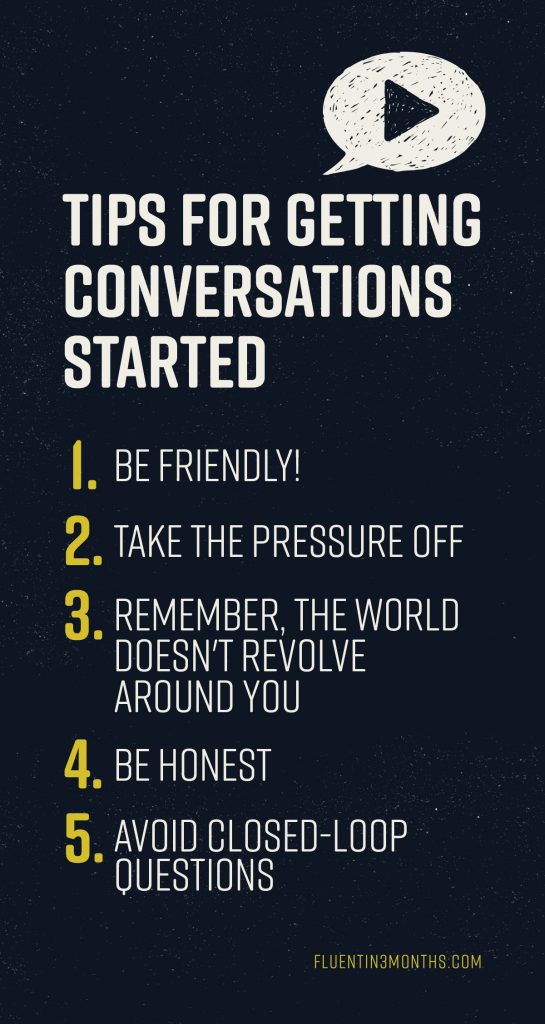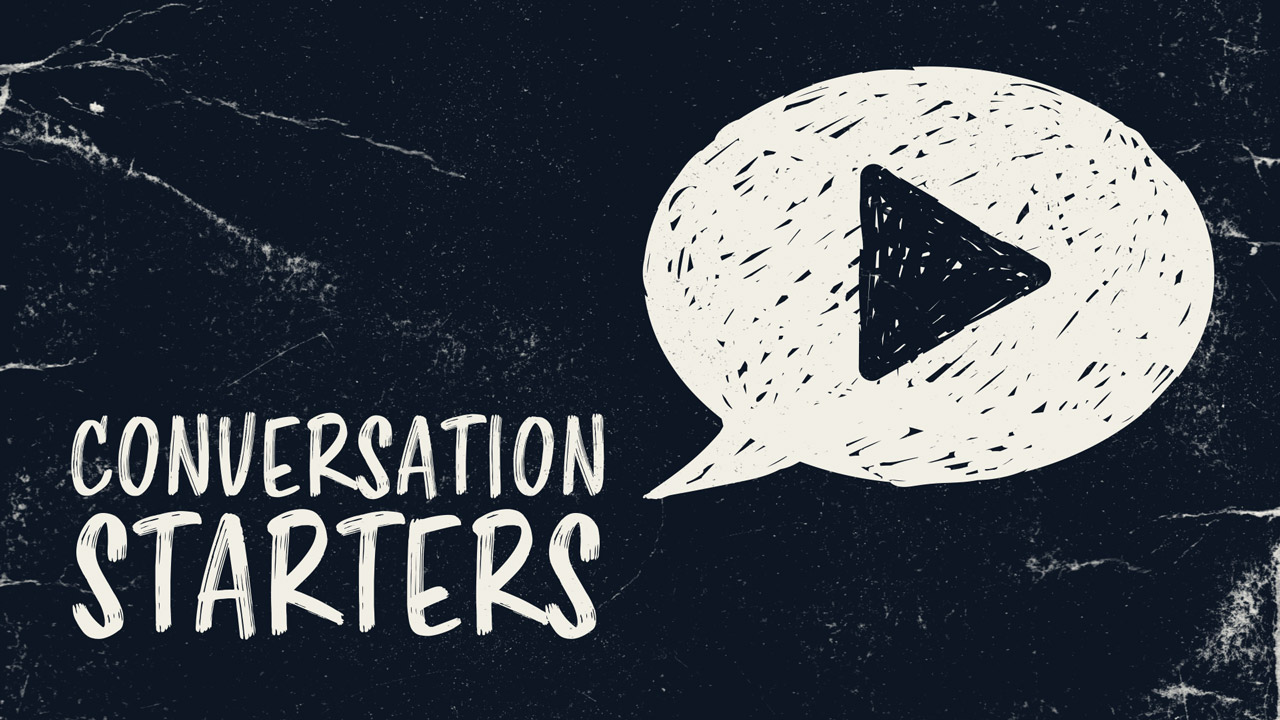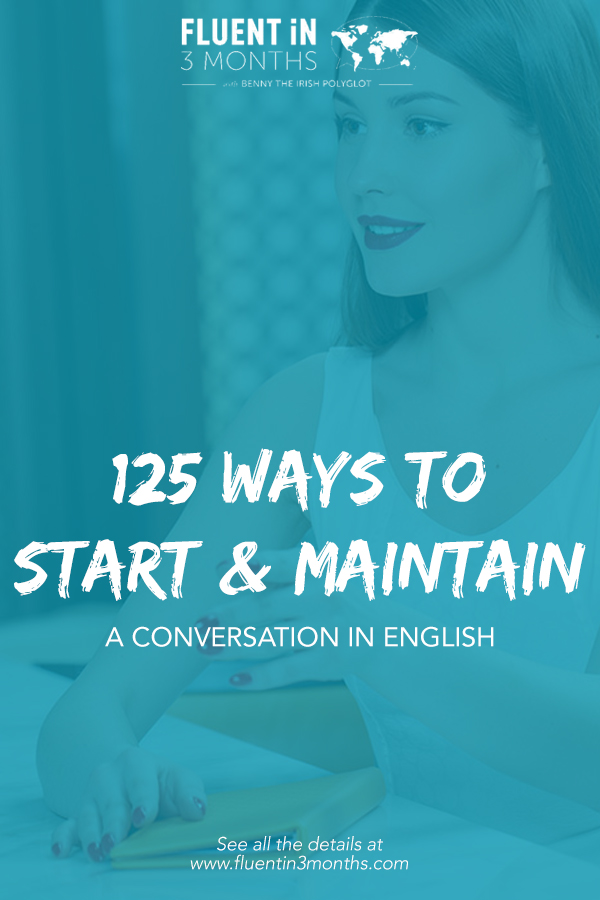150+ Conversation Starters So You Can Confidently Talk to Anyone, in Any Language
Are you shy and want to confidently start conversations? Or perhaps you're trying to overcome being an introvert and would like ideas for how to get speaking practice. These conversation starters will help.
I know it can be scary to start a conversation with someone or to join a group conversation – especially when you’re speaking your second language (I wrote this article for language learners, but I’m sure you’ll find it valuable even if you only speak English).
You might be wondering “what do I say?” or “what if I say the wrong thing?”
Speaking conversationally is usually just about knowing the right thing to say in any given situation. That's rarely taught in classrooms.
With that in mind, this article answers the questions “How to start a conversation in another language?” and “What’s the best conversation starters to have things to talk about, without the awkwardness?”
You'll learn questions, phrases, and expressions that you can use to confidently start conversations with anyone, in any language.
In this article, I cover two types of situations:
- Speaking one-on-one
- Speaking in a group
I've also included specific phrases and expressions based on the context of where you're speaking.
- Context: Location – Seeing someone in a restaurant, cafe, airport, or at school can have an impact on the sorts of things you can say.
- Context: Event – Are you at a party? Attending a wedding? At a concert? We'll share some phrases that will help you based on what is going on around you.
Lastly, these phrases will be in English, but use them as ideas for what phrases to look up and translate so you can start conversations in any language.
Using these phrases will improve your conversation skills, so practice them and soon you'll be starting conversations in English!
How to Get Over the Fear of Starting a Conversation in English

Before we get into the thick of things, I'll let you in on the mindset you need to have when starting up a conversation.
The fear of speaking to strangers really comes from the fear of seeming “weird” or looking foolish.
You're essentially afraid of the other person's reactions, like a strange look that says “I don't want to talk to you”, or even someone laughing at you. (Of course, this very rarely happens in real life!)
To be honest, I still experience moments of fear when I start conversations in a language I'm learning. It sometimes takes me a few minutes to get into the flow.
Just know that this feeling is totally normal. Try to accept it as normal, and not to worry about it too much.
Here are some tips for getting conversations started:

Conversation Tip #1: Be Friendly!
The first key to feeling relaxed and getting over your fear is to have a good time and be friendly.
Smile and enjoy the experience of meeting someone new. If you can relax and enjoy getting to know someone, then that will be felt by the other person and it will put them at ease.
Talking with someone who is super serious and has a grave expression is rarely enjoyable, so why put someone else through that? Relax your face and turn that frown upside down!
Talk to people as you would talk to a friend, and they may just become one.
Conversation Tip #2: Take the Pressure Off
A lot of fear around starting conversations comes from putting pressure on yourself to have a certain result from the conversation.
So, stop having specific expectations about what will happen! Whatever happens, happens.
Don't expect anything from yourself or the other person other than getting to know them a little better.
Also, don't force a topic or be aggressive in what you're trying to say. That type of energy is a turn-off to someone you've just met. Let the conversation flow naturally.
Finally, realize that you don't need to become best friends with your conversation partner. There are millions of native speakers out there, so becoming friends with this one person won't determine your success. If the conversation doesn't go well, that's okay.
The next opportunity is just around the corner.
Conversation Tip #3: Remember, the World Doesn't Revolve Around You
Don't make the conversation only about yourself. Try to ask questions about the other person's life. Only interject things about yourself when they are actually relevant to the topic.
What if they ask you a question about yourself? Answer it. But then ask them the same question.
Often people ask questions they secretly want to be asked themselves, so turn the question around and see what your conversation partner has to say.
The most important thing is to not be forceful or seem desperate. Bring things up naturally and casually. People should never feel pressured to talk with you, so help them feel comfortable.
Conversation Tip #4: Be Honest
When asking questions or talking about something, don't make something up just because you memorised a particular phrase.
For example, don't say “I love cats too!” if you actually hate cats. Or avoid saying “My uncle works in a factory” when you don't even have an uncle, let alone one that works in a factory.
Make sure you say things that are true, even if it means searching for the words you need.
Otherwise, you could end up in a really awkward situation.
Conversation Tip #5: Avoid Closed-Loop Questions
Questions that can only be answered with “yes” or “no” are called closed-loop questions, because they close down the conversation.
Open loop questions work much better when your aim is to keep a conversation going.
Let's look at the difference between these through a couple of examples.
Instead of asking the closed question “Do you like apple juice?”, ask the open question “What is your favourite type of juice?”
Or, instead of asking “Do you like spaghetti?”, you can ask “How often do you eat Italian food?”
Open-loop questions invite further discussion, whereas a “yes” or “no” question usually only invites an end to the conversation.
Now that you have the right mindset, let's get into tips for having topics to talk about!
Conversation Starters for Speaking One-on-One

A conversation has specific phases that it goes through. These include starting the conversation, elaborating on a topic, inviting a longer conversation, changing the topic, and closing the conversation.
When talking to someone one-on-one, you'll find it helpful to look at each phase and figure out your approach for the phase to figure out what to talk about.
Here's a specific structure you can follow:
Phase 1: Begin with Good Conversation Starters
The best way to start up a conversation with someone you don't know is to ask a question that's not too personal.
Here are some examples of polite questions you can ask to get things going:
- “Excuse me, do you have the time?” or “Do you know what time it is?”
- “Hi. Is this seat taken?” if the answer is “no”, then you can follow up with “Do you mind if I sit here?”
- “Pardon me. Do you know what time this place closes?” (assuming you are in a place of business, where “place” can be replaced with “restaurant” or “cafe” or “store”).
Even better, start a conversation by noticing something about the other person and commenting on it in a nice way. Here are some examples:
Note: whatever you see in [brackets] can be substituted for something specific to your conversation.
- “That is a really nice [hat]. Can I ask where you got it?”
- “I really like your [shoes]. Did you get them near here?”
- “That's a cool looking [phone]. Is it easy to use?”
Phase 2: Elaborating on the Conversation Topics
Now that you've started talking, you will need to elaborate on the established topic and continue talking.
If they answered your question, you can ask one or two follow up questions to get more details, such as:
- “Is that store near here?”
- “Was it good value?” (Try to avoid asking for specific monetary amounts of items like “How much did it cost?” as that can be considered rude.)
- “Do they have other colours available?”
Next, provide some context as to why you asked them the question in the first place. Here are some examples:
- “The reason I asked is because I've been thinking about replacing my phone.”
- “I've been looking for a hat like that to give to my friend.”
- “Yeah, the shoes I have are getting worn out. It's time to get a new pair.”
And, as always, if someone is being helpful, don't forget to thank them!
- “Thanks for the suggestion.”
- “I appreciate the information.”
- “Thank you. That was really helpful.”
Phase 3: Extending the Conversation with More Questions to Ask People
You can usually tell when a person is losing interest in a conversation. If you reach that point, then excuse yourself and be on your way.
However, if you feel like the person may be receptive to a longer conversation, then why not talk a bit more and get to know them better?
Here are some more general questions you can ask to keep the conversation going.
- “Are you from this area?”
- “So, what do you do for a living?”
- “What brings you here today?”
- “Do you come here a lot?”
Each of these questions can be used to extend the conversation and learn more about the other person.
The idea here is to find common points of interest. When they mention something that relates to you and your life, this gives you an opportunity to explore that topic more fully.
Phase 4: Exploring a Topic Further – What to Talk About Next
When your conversation arrives at a topic that you're comfortable speaking about in your target language, then this is your chance to discuss it in more depth.
As an example, let's say that you discovered your conversation partner has a cat. You have a cat, too. Time to show some photos of your cat on your smartphone!
Or, if the person mentions they are a vegetarian and you happen to be vegetarian, now you have something in common. Why not ask about their favourite vegetarian recipes?
Here are some sentences and phrases that may come in handy to dive in deeper with a topic:
- “Really? I'm a [vegetarian] too! What made you decide to [stop eating meat]?”
- “I love [cats]! In fact I [have two]. What type of [cats] do you have?”
- “[Football] is my favourite sport! What team do you support?”
- “You're kidding! I [drive a motorcycle] as well. What type of [bike] do you have?”
The idea here is to let them know you share a common interest, then ask them to share more details.
Remember to talk about the other person more than yourself.
For example, instead of going off on a long tangent about your favourite recipes, ask them for theirs. It shows that you are truly interested in getting to know them and they’ll be more open to continuing the conversation.
Phase 5: Asking for Opinions and Interesting Questions to Ask
Everyone has an opinion on something, and many people like to share them with others. So coming up with interesting questions to ask doesn’t have to be hard.
Just ask for their thoughts and opinions!
Here are some questions you can ask to get the other person's view on a situation or topic:
- “I don't know. What do you think?”
- “Has that been your experience too?”
- “Has that ever happened to you?”
- “Why do you think that is (the case)?”
- “Is that a good thing or a bad thing?”
Once people start sharing their opinions, you open up the door for a whole new area of conversation.
Phase 6: Changing the Topic with Conversational Connectors
Sometimes a conversation can start to fade and you find things are winding down.
If you sense your conversation partner is losing interest in talking about your impressive collection of snowglobes, it's probably time to change the topic! Use conversational connectors to do just that.
Here are some ways you can switch to other topics:
- “That reminds me…”
- “Oh hey. Did you hear that…”
- “Speaking of [horses], I found out that…”
Or, if you want to make a more abrupt change, you can just say it directly with:
- “Okay, I'm totally changing the topic now, but I was wondering…”
- “Not to go off-topic, but I recently heard that…”
Phase 7: Inviting Your Conversation Partner to Talk Longer
After about 10 or 15 minutes, it's worth checking that your conversation partner wants to continue talking. Get a confirmation that they want to be in the conversation so you can be sure they aren't just being polite.
Here are some questions you can ask to see if it's possible to maintain a longer talk.
- “I'm not keeping you from something, am I?”
- “Sorry for taking up so much of your time. Do you need to take off?”
- “I just realised you're probably in the middle of something. Do you have time to chat?”
- “Let me know if you need to get going. I don't want to take up all your time.”
These sorts of expressions show that you are being considerate of your conversation partner's needs.
Phase 8: Closing the Conversation
Part of being a good conversationalist is knowing when to stop talking.
When the conversation ends, find a way for them to get in touch with you in the future. If you feel like they might want to chat again, you can give them an opportunity with some of these phrases:
- “Well, if you ever want to chat again, I'm usually here [every Monday afternoon].”
- “Let me give you my email address. If you're ever in the area again it'd be great to meet up.”
- “Feel free to call me if you want to hang out. Here, I'll give you my number.”
And remember to make them feel appreciated too!
- “I really enjoyed our chat. Thanks so much.”
- “It was really nice meeting you.”
- “I had a great time talking with you. Hope to see you again soon.”
Joining and Talking in a Group Conversation
Not all your conversations are going to be a one-on-one encounter. Sometimes you will be joining a group where others are talking.
The most important skill in group situations is listening. Pay attention to the conversation and interject only when it is relevant.
Many of the phrases you've learned so far in this article can work in group situations. You can also add to a group conversation with other types of phrases, such as sharing your experiences or thoughts, asking questions to the group, or making connections between two people.
Here are some phrases you can use:
Conversation Starters for Sharing Experiences or Ideas

If you have something to add to the conversation, here are a few examples of how you can do it:
- “Actually, that happened to me once. It was really [annoying].”
- “I totally agree. The same thing happened to me too.”
- “That's pretty common. I heard that a lot of people had the same experience.”
You don't need to share too much, but let the group know that you have more information to add. If they want to know more, they can ask for details.
Asking Questions to the Group
If you notice that some people in a group aren't participating as much in a conversation, you can ask questions for the whole group.
Here are some questions to stimulate more dialogue:
- “Has anyone ever … ?”
- “How many of you think that …?”
- “Do a lot of you … ?”
- “Which one of you … ?”
Or, you can direct it to an individual. Just be sure not to single them out in an uncomfortable way. Here are some examples:
- “What do you think [Diana]? Has that ever happened to you?”
- “Hey [Carlos]. Didn't you also … ?”
Making Connections Between Two People
You may realise that two of the people in the group have something in common. You can make people feel included and connected by sharing these observations with the group.
Here are some ways to do it:
- “Actually, [Navvab], didn't you go there last year too?”
- “You should ask [Samson] about that. He had the same thing happen to him.”
- “[Makoto] has the same [phone]! Where'd you get yours, [Makoto]?”
This can help people feel like a part of the group. Of course, don't let out anyone's secrets!
Closing the Conversation or Leaving the Group
If you have to get going and want to excuse yourself from the group, here are some quick and easy ways to do so:
- “Hey, I better get going. I have a long day tomorrow.”
- “Hey guys. Sorry, but I have to run. It was great chatting with you all.”
- “Oh man, it's getting late. I better head out.”
- “Alright guys. Time for me to go. Have a good one.”
Conversation Starters in Context: On Location
Often what you say directly relates to where you are.
Whether you're in a restaurant, the airport or on the job, you should have some phrases handy to start up a conversation that relates to your location.
Topics to Talk About In a Restaurant or Cafe
Here are phrases and expressions you can use to start and maintain a conversation in a restaurant or cafe:
- “Do you have a recommendation on any good dishes?”
- “What would you recommend for someone who hasn't eaten here before?”
- “What is the best drink here?”
- “Do you know if the [chow mein] is any good?”
- “Have you ever had the [asparagus]?”
- “If you had to eat just one meal for the rest of your life, what would it be?”
- “What is your favourite dessert?”
- “What is your favourite spicy dish?” (They don't like spicy? Great! Ask them why, and keep the conversation going.)
Finally, here are some phrases you can use at the end of your conversation:
- “Enjoy your pasta!”
- “Have a good meal!”
Conversation Starters When You’re At Someone's Home
If you're visiting someone's home you're in luck! There are an endless supply of possible things to talk about. Just look around the house and you'll see many things to bring up and discuss.
- “How long have you lived here?”
- “Do you like the area?”
- “Where did you get this [bookshelf]?” (or television, chair, porcelain fountain, etc.)
- “What is your favourite thing about this house?”
- “How many people live here?”
- “Is this house close to [your work]?” (or school, or the park, or the airport, etc.)
- “How far away is the [supermarket]?”
And here are a few home-specific statements that you can say when leaving someone's home:
- “Thank you for having me over!”
- “Thanks for inviting me to your home.”
- “I had a wonderful time.”
Things to Talk about When Exploring the Streets
Sometimes you bump into someone when you are out and about. They might be sitting on a park bench, or waiting in line at the bus stop.
Here are some questions and statements you can use to start and keep up a conversation:
- “Do you know where a [bakery] is around here?”
- “What street is this?”
- “Do you know what time [bus 37] comes by?”
- “Where can I buy a [bottle of water]?”
- “What is your favourite thing about [this park]?”
- “How crowded are the buses when they get to this stop?”
- “Can you recommend a good restaurant around here?” This can be followed by “What is your favourite dish there?”
Questions to Ask People At the Airport
From personal experience I know that airports are often a place where you have to “hurry up to wait”.
You rush through customs or security only to sit at the gate waiting for your plane for several hours (or longer if it is delayed).
This is a great chance to chat to someone in English. Here are some phrases that can get things started:
- “Have they announced the boarding time for this flight?”
- “Is there a place to charge a phone nearby?”
- “So, where are you headed today?”
- “Do you know what time we arrive at the destination?”
- “Is this your preferred airline?” followed by “why is that?”
- “Are you flying home or are you flying away from home?”
- “Where is the favourite place you've ever visited?”
- “Have you ever had the chance to fly in first or business class?” then “what was it like?”
- “Can you recommend any good restaurants or sights in [Buenos Aires]?”
Because you're flying somewhere, odds are you will never see your conversation partner again. That means you don't have to worry about making a fool out of yourself because your connection with them will be short lived and temporary.
Plus, there is a good chance someone you talk to may have some great suggestions about places to see or things to do in your destination city.
Conversation Topics On the Job
If you're working among natives, then this is a perfect chance to strike up a conversation. After all, you already have something in common!
Here are some phrases you can use to start up a conversation with a work colleague:
- “How did you come to work here?”
- “What is your favourite place to eat lunch near the office?”
- “What do you enjoy most about your job?”
- “What is your eventual career plan?”
- “What do you think is the most important thing to succeed in this company?”
What to Talk About At School
You may be a student and find yourself studying abroad. Why not get to know the other students better? Here are some questions you can use:
- “How long have you been a student here?”
- “What are you studying?”
- “What do you recommend to eat on campus?”
- “Do you know a good, quiet place to study?”
- “What do you plan to do when you finish your studies?”
As you can see, you really can make friends anywhere, and you should never be at a loss for a way to start up a conversation.
Conversation Starters: Events

You've been invited to a special event and want to be able to start up a conversation with the people there. The wonderful thing about events is that you automatically have a point of common interest.
Just explore that common thread further to weave a full tapestry of interesting conversations.
Topics to Talk About at a Birthday Party
A birthday party is a fun place to get to know someone and it's really easy to start speaking with a total stranger. Here are some phrases to help you get going:
- “How do you know [the birthday person]?”
- “What do you think of the [birthday cake]?”
- “What is the best birthday party you've ever been to?”
- “If you could re-live any year of your life, which one would it be?”
- “When is your birthday?”
Small Talk for When You’re at a Wedding
The joining together of two people in marriage is a joyous event, and while you're there throwing confetti and dancing the Conga, be sure to sit down and have a chat with someone new!
Try out these phrases to help break the ice:
- “Are you a friend of the bride or the groom?”
- “What’s the best wedding you've ever been to?”
- “If you were going to plan the perfect wedding for your best friend, what would it be like?”
- “Do you like dressing up in formal attire?”
- “Do you know where they are going on their honeymoon?”
Conversation Starters at a Sporting Event
A match or game can be a perfect opportunity to make some fast friends. Connecting with others who share a passion for sport seems to automatically create a bond between people.
Here are some questions you can ask at the next big game:
- “Who do you think will win?”
- “Have you been following all the matches this season?”
- “Who is your favourite player?”
- “Do you play the sport yourself?”
- “What do you think the score will be?”
Questions to Ask People at a Concert or Performance
Music fans love seeing their favourite performers on stage. If you have tickets to an event or are just sitting in a cafe watching someone strum a guitar, be sure to strike up a conversation with other music enthusiasts near you.
- “What's your favourite song of theirs?”
- “Do you play music yourself?” or “Do you play an instrument?” or “Do you sing?”
- “How often do you go to a show?”
- “What do you like about this performer?”
Random Conversation Starters
If you’re looking for interesting questions to ask outside the norm, these are a good place to start. After all, sometimes a random question helps build interest in the conversation.
- “What’s your favorite thing in the whole world?”
- “If you could spend your time doing anything, what would you do?”
- “What’s your dream [job, vacation, etc.]?”
- “What’s your favorite number and why?”
- “Do you have pets?”
- “Are you a dog or cat person?”
- “If you were the star of a TV show, what would be your theme song?”
- “Who is your favorite actor or actress?”
- “Where’s the most beautiful place you’ve ever been?”
- “What’s your favorite place in the world?”
- “Where’s your favorite place to chill?”
- “Are you a morning person or a night owl?”
- “What’s your favorite season and why?”
- “What’s your biggest pet peeve?”
- “What was your favorite childhood TV show?”
Conversation Starters for Texting
It can be hard getting a conversation going on text, since it’s not face-to-face and hard to read the other person’s feelings.
But these conversation starters will help get the ball rolling:
- “Do you have plans this weekend?”
- “Working on anything exciting right now?”
- “Do you watch [The Mandalorian]?”
- “What are you up to today?”
- “How was your day?”
- “How did your [meeting/work presentation/project/whatever they mentioned last] go?”
Conversation Starters on Zoom or Conference Call
Zoom has quickly become a huge part of everyone’s lives, with so many people working from hom now or talking long distance.
If that’s you, here’s some ideas for breaking the ice:
- “How’s everyone feeling right now? Holding up okay?”
- “What’s everyone been watching on Netflix?”
- “What new books are you reading?”
- “Who’d like to do a virtual [hang out/game night/movie night]?”
- “Has anyone tried any new recipes lately?”
- “How’s everyone’s self care going right now?”
- “Have you discovered any new podcasts lately that you’re loving?”
Zoom can be a bit awkward, but depending on the situation, most of the other general phrases on this list would work, too! Just ask about life at home or work — and things will surely go from there.
Be Friendly, Considerate, and Open Your Mouth!
There you have it. 150+ different ways to strike up a conversation and keep it going strong.
Sure, it can be intimidating when you consider talking to a total stranger. Especially if they speak a different language than you.
But getting over your fears is the first step, not only in language learning, but in being able to meet fascinating people and make long-lasting friendships.
Just remember these main points:
- Be friendly! — Even if the other person doesn't have time to talk, at least they'll appreciate your pleasant demeanour.
- Take the pressure off — When you come in with expectations you may become easily disappointed. Just have fun and let whatever happens, happen!
- Talk about them — They don't want to hear your life story (At least not yet). Ask them questions that show you want to get to know them better, and they'll probably reciprocate with the same.
- Be honest — No need to make up an impressive story to get someone's attention. Just be yourself and tell the truth.
- Ask open loop questions — A “yes” or “no” can be a conversational dead end. Ask questions that spur on further discussion.
We've covered a lot of potential situations and questions or phrases you can use in each one.
But whether you use these approaches or just throw on some random accessories, the goal is to speak at every opportunity.
You'll notice I didn't say the goal is to talk for 15 minutes. And I didn't say the goal is to bring up a specific topic. The only goal is to open your mouth and start talking in your target language.
Getting a conversation started is the biggest hurdle. It is the one action that will have the most significant impact on your language learning (and friend making) success. Be open to whatever happens from that point forward and you will multiply your chances of improving your skills




Social